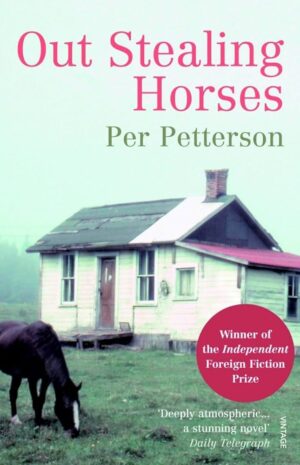Approaching his twilight years, Trond Sander has fulfilled a lifelong yearning for rural solitude; a small house in the farthest reaches of eastern Norway, with a dog and the radio for companionship. The 21st century is hovering into view but Trond has no plans for Millennium celebration, instead anticipating a mellow, boozy evening in front of the fire. His new resolve to inhabit only the present moment is upended by the shocking appearance of a character from Trond’s past. In Out Stealing Horses by Per Petterson, a reckoning is long overdue with the psychic wounds and repercussions of childhood tragedy and loss.
When boyhood acquaintance, Lars Haug, turns out to be a near neighbour, Trond observes that this is the sort of absurd coincidence that only occurs in his favourite Charles Dickens novels. But there he is, Lars, the brother of Trond’s childhood friend, Jon, half a century older now, and in possession of certain facts that have remained buried since 1948. His appearance releases a stream of memories for Trond, drip-fed to the reader throughout Petterson’s beautifully restrained and atmospheric novel, beginning with the very nub of the story, at a countryside cabin with his father in the fateful summer of ‘48.
We’re going out stealing horses, Jon says that particular July morning, goosebumpy on the doorstep as the sun struggles to dissolve the early mist. Taciturn and intrepid, he offers friendship and an outdoors education to city boy Trond. Both fans of American westerns, their adolescent spin on horse rustling involves horse whispering and a dash of bareback riding before letting the animals go. But today’s adventure goes horribly awry when Jon appears to undergo a mental breakdown, the aftermath of which leaves Trond digesting village gossip of a loaded gun, a desperate moment of carelessness and the subsequent vanishing of his playmate.
An incident that Trond has spent his life burying resurfaces. Time and memory have come for him and in Petterson’s multi-layered tale other secrets reveal themselves in recollection.
His momentous childhood summer occurred three years after the end of Nazi occupation in 1945, with the ‘brilliance of liberated Norway’ still large in the national psyche. The youthful, unquestioning Trond had never considered the lengths some adults would go to to achieve freedom, or the impact it would have on his own life. But old-man Trond must.
Recollections are set against the backdrop of bygone village life and Petterson gives us some wonderfully evocative descriptions of a traditional rural community, villagers coming together for timber felling (Trond bewitched by the overwhelming aroma of resin and the rhythm of the hatchet). Then too, the dying art of haymaking.
‘No-one makes hay this way any more…so the feeling of pleasure slips into the feeling that time has passed, that it is very long ago and the sudden feeling of being old.’
A glorious exploration of coming to terms with one’s past, Out Stealing Horses is surely destined to become a Norwegian modern classic.
Out Stealing Horses by Per Petterson is translated by Anne Borne published by Vintage, 272 pages.





